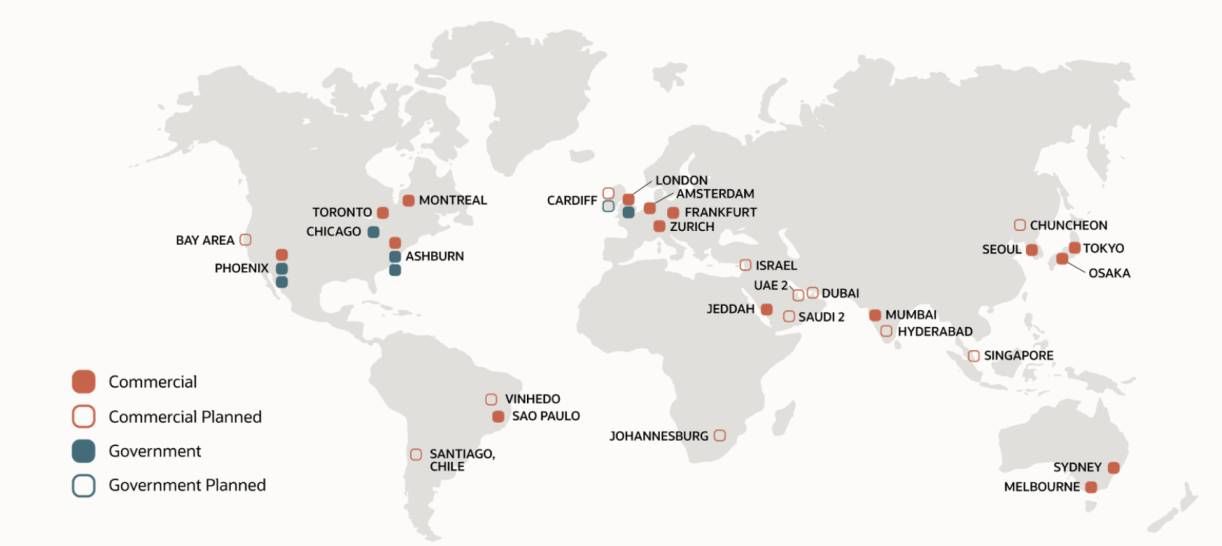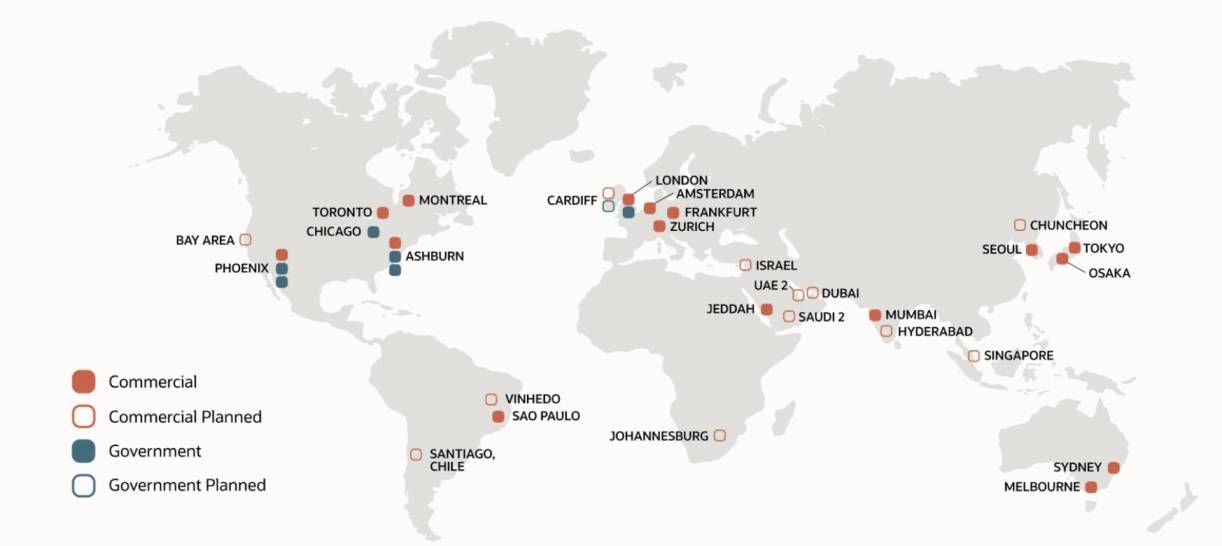Zoom picked Oracle as a new cloud provider. This news caught some people by surprise. In hindsight, there are signs that this agreement was in the works, aggressively pushed forward by Oracle, and punctuated by its founder Larry Ellison’s uncharacteristic Youtube video 15 days before the deal announcement that was basically a Zoom infomercial.
Why Oracle would bend over backward to pursue Zoom as a customer is obvious.
But why Zoom would want Oracle is not.
I think there are three rationales behind this Zoom-Oracle alliance: a good long-term deal, government business expansion, and de-risking telemetry access.
A Good Long-Term Deal
Zoom likely locked-in a hefty discount in a long-term deal with Oracle Cloud that will keep Zoom’s cloud infrastructure cost predictable and under-control for years to come. Although there were no deal details disclosed in the announcement press release, long-term deals in the cloud industry -- any agreement longer than three years -- could result in 70%-80% in discounts, especially when the buyer is in a strong negotiating position.
Zoom is most certainly in a strong negotiating position. Its user base jumped from 10 million in December, to 200 million on April 1, to more than 300 million on April 22. (Update: since this post's initial publication, Zoom clarified that its 300+ million number reflects "daily meeting participants", not "daily users.") Meanwhile, Oracle Cloud has been a sideshow at best in the cloud industry, badly in need of a marquee customer to boost its growth and image. It also has the capacity to absorb a big user like Zoom, with its aggressive investment in data centers and technology R&D over the last few years. On the other hand, AWS is in a stronger position than Oracle to negotiate. Although AWS has been generous with Zoom with discounts during Zoom’s current growth spike, it has not been that way with other customers. AWS has been holding up well during COVID-19 compared to its closest competitor, Microsoft Azure (a topic I explored a few weeks ago in “Azure Cracks, AWS Strong: COVID-19 Stress Tests the Cloud”). Thus, its services and reliability are more in demand than perhaps ever before,
Zoom can get whatever deal it wants with Oracle. It cannot with AWS.
Just how good could this deal be? Snap’s long-term agreements with AWS and GCP can be a reference. Snap negotiated both deals during the year before it went public in March 2017 -- when its negotiating position was strongest. With AWS, Snap locked in a five-year deal worth $1.1 billion USD between 2017 and 2022. With GCP, Snap secured a five-year deal worth $2.0 billion USD over the same time span. (For more on this topic, see my earlier post: “AWS and GCP Are the Real Winners in Snapchat’s Growth”.)
Before you jump on me about how different Snap is to Zoom, yes, their business models and markets are completely different, but their workloads and product characteristics are quite similar. Both are visual-first communication tools with many end-to-end connections. Both enhance that experience with some levels of augmented reality, e.g. doggie-ear filters and virtual backgrounds. (Zoom even used to support Snap Camera, but recently paused it to focus on more pressing privacy and security issues, to the chagrin of one Kim Kardashian.)
In short, both produce similar types of demand on compute, storage, and network transfer. And technical workloads dictate how a company consumes cloud, not business models.
Government Business Expansion
This alliance could help Zoom do more business with governments, both in the U.S. and other regions. Government contracts are highly sought-after deals in the B2B enterprise business. Even though they are extremely difficult to procure, full of red tape, and political in nature, it’s ultimately worth the trouble, because they become large, steady revenue streams that are hard to replace by competitors.
U.S. Government
Oracle is known for its aggressive lobbying practices in Washington, D.C. Perhaps its most aggressive, high-profiled lobbyist is Larry Ellison himself, who is now squarely in Zoom’s corner.
Ellison is also known for having a close relationship with President Trump, from hosting fundraisers to discussing coronavirus treatments. Trump himself has never been shy about abusing his power to enrich himself, his family, or hurt political enemies. The most relevant example in the cloud context is the pending lawsuit Amazon has filed against the Department of Defense for awarding the lucrative JEDI cloud contract, worth at least $10 billion USD, to Microsoft. The lawsuit alleges that Trump used his power to influence the procurement process to hurt Amazon, because Jeff Bezos owns the Washington Post, a media outlet that has been critical of Trump. (Ironically, Oracle Cloud was nowhere near scoring that deal.)
If Trump wins a second term, which is entirely possible, his current tendencies will only grow and amplify unfettered. In that scenario, Ellison may become a more influential voice during Trump’s second term and use that influence to expand Oracle’s business with the Federal government, bringing along its own customers and friends as well.
This thought may not sit well with you from a business ethics and morality perspective, but it’s not baseless speculation. It’s an educated guess based on Trump’s track record on ethics during his first term and how government contracting works in general.
Ellison has shown his willingness to go to bat for Zoom. Lest you think I’m making too big a deal out of his 51-second video, Ellison has never made a Youtube video like this before. It's hosted on Oracle's official channel, not a personal one. What's more, Ellison has probably never publicly mentioned another non-Oracle product positively without also touting an Oracle product. But in this video, he begins and ends with Zoom becoming an “essential service” with no mention of an Oracle product.
For Zoom, having Ellison as a willing lobbyist by its side possibly whispering into Trumps’ receptive ears for four more years, makes a lot of strategic sense. Although Zoom already counts the Departments of Homeland Security and Energy as customers, more business with the U.S. government is the best “disinfectant” to the FUD around its connection with China. During the recent set of bad headlines surrounding Zoom’s poor security implementations and privacy practices, many discussions gravitated toward Zoom’s sizable engineering team in China, its China-based servers, and even Eric Yuan’s own ethnicity.
While I don’t agree with all the China FUD, the stench of FUD is hard to shake off in enterprise and government sales. Oracle is no stranger to dishing out its own FUD; perhaps it can help Zoom get rid of some.
European Governments
Besides the U.S., Zoom has many opportunities to expand business into other countries’ governments as well. This is an area that Oracle Cloud is somewhat uniquely situated to help with, especially in Europe. If you take a look at Oracle’s global data center coverage, it’s one of the few cloud platforms with a designated government region in Europe with plans to build more.

Parts of the French government are already Oracle Cloud customers, while Zoom’s organic growth has led to at least one Prime Minister in Europe hosting a Cabinet meeting with Zoom and tweeting out an ill-advised screenshot of it. Zoom could grow its government business in Europe on top of Oracle’s existing infrastructure and business relationships in significant ways.
This morning I chaired the first ever digital Cabinet.
— Boris Johnson #StayHomeSaveLives (@BorisJohnson) March 31, 2020
Our message to the public is: stay at home, protect the NHS, save lives. #StayHomeSaveLives pic.twitter.com/pgeRc3FHIp
De-Risk Telemetry Access
Before using Oracle, Zoom has been running a multi-cloud infrastructure set up with AWS, Azure, and its own data centers. Thus, “multi-cloud’ in and of itself is not enough to explain why Zoom chose Oracle.
The deeper strategic consideration, I think, is Zoom’s concern with AWS and Azure accessing its telemetry. In plain terms, the “telemetry” of a tech product is all the operational information related to running that product: traffic amount, usage pattern, data created, everything. If you deliver a product on top of a third party cloud platform, that cloud can see all the telemetry data. Such access becomes problematic when that same cloud platform offers a competing product, which is why no big retailer would ever run their e-commerce operation on AWS.
Zoom is rightfully concerned about increasing its reliance on AWS and Azure, both of which provide similar videoconferencing products, Chime and Teams, respectively. GCP probably fell out of consideration as well, because of its own videoconferencing product, Google Meet. Zoom’s concern only became real in the last couple of years if we look at the timeline of these products’ birth:
- Zoom launched its first product in Q1 2013
- Amazon Chime launched in Q1 2017
- Microsoft Teams launched in Q1 2017
- Google Hangouts becomes Meet and Chat in Q1 2017
In particular, Teams has been aggressively making noise in the market, openly competing with Slack and also positioning itself as a Zoom alternative.
Oracle Cloud does not have a competing product. Based on Ellison’s video endorsement of Zoom, Oracle the company appears to be using Zoom wall-to-wall, instead of dog-fooding any internal product under development. To keep Zoom onboard for the long-term, it may never develop a competing product and thus has no incentive to snoop around Zoom’s telemetry.
To be clear, there is no indication yet that Zoom is reducing its usage of AWS or Azure. To handle its current phase of hypergrowth, it could use all the cloud capacity it can get right now. Keeping all its users happy, secure, and trusting of the product is the most immediate task; telemetry access by competitors is a medium-term concern. But if you can de-risk it now, while getting a great discount and an effective lobbyist by your side, why not?
If you like what you've read, please SUBSCRIBE to the Interconnected email list. New posts will be delivered to your inbox (twice per week). Follow and interact with me on: Twitter, LinkedIn.
Zoom为什么选择了Oracle
Zoom选择了Oracle作为新的云计算提供商。这个消息让有些人感到惊讶。事后看来,有迹象表明,这个合作早在酝酿当中,Oracle在大力推进。Oracle创始人Larry Ellison在合作宣布前15天破天荒地录了一段YouTube视频,整段视频基本就是在给Zoom打广告。
Oracle想要Zoom这个大客户并不奇怪。
但Zoom为什么选择了Oracle呢?
我认为这个Zoom-Oracle联盟的背后有三个原因:优惠的长期协议、政府业务的扩展和降低遥测数据被竞争对手所用的风险。
一笔长期的好交易
Zoom很有可能在与Oracle Cloud的交易中得到了长期的巨额折扣,这将帮助Zoom有效的在未来几年预测和控制云计算设施成本。尽管在公告中没有披露交易细节,但云计算行业里,长期交易(任何超过三年的协议)可能会有70%-80%的折扣,特别是当买家处于有利的谈判地位时。
Zoom无疑处在一个强有力的谈判地位。其用户基数从去年12月的1000万,跃升至4月1日的2亿,再跃升至4月22日3亿以上。(更新:在本文出版以后,Zoom官方澄清这个“3亿以上”的数字是指“每天视频会议参与人数”,而不是“每日用户”。)Oracle Cloud还只是云计算市场里的一个小玩家,急需一个大客户来推动自己的增长和形象。从技术资源角度来看,它也有能力吸收像Zoom这样的大用户。在过去几年里,Oracle Cloud还是在积极投资于数据中心的建设和技术研发。另一方面,AWS在谈判地位方面要比Oracle优越些。尽管AWS在Zoom当前的增长高峰期间也提供了折扣,但在对他客户上总体却不是这样。在疫情期间,AWS与它最接近的竞争对手,微软的Azure相比,一直表现得更好。(我几周前在 “Azure有裂痕,AWS很靠谱:COVID-19对云的压力测试” 这篇文章中探讨过这个话题。)因此,各大公司对AWS的服务和可靠性的需求可能比以往都要大。
对于Oracle,Zoom想要什么都要得到。AWS就不一定了。
这笔交易到底有多好?Snap与AWS和GCP的长期协议可以做参考。Snap是在2017年3月上市前的一年里签的这两项交易,当时Snap的谈判地位应该是最有利的。与AWS的协议是,2017年至2022年间在AWS上用价值11亿美元的服务。与GCP的协议是,同样的五年时间里在GCP上用价值20亿美元的服务。(如果对这个话题有兴趣,请看我写的另一篇文章:“AWS和GCP才是Snapchat增长的真正赢家”。)
在大家批评我怎么能把Snap和Zoom做对比之前,请先听我解释:的确,两公司的商业模式和市场完全不同,但是它们在技术上的工作负载和产品特性非常相似。两者都是用户对用户之间的视觉优先通信工具。两者也都有很多AR/VR的功能和体验,例如狗狗耳朵过滤器和虚拟背景。(Zoom甚至曾经支持过Snap Camera,但最近因为要解决更紧迫的隐私和安全问题而暂停了对这个功能的支持,而且让社会名流Kim Kardashian感到懊恼。)
简单的说,两者的产品特性注定会产生类似的计算、存储和网络传输的工作负载需求。技术负载决定一个公司怎么用云,而不是商业模式。
拓展政府业务
Zoom和Oracle的联盟可以大力推动Zoom与美国和其他地区的政府开展更多业务。与政府合同是B2B行业中备受追捧的交易。尽管它们的采购过程很艰难,充满繁文缛节和政治因素,但最终还是值得付出的,因为金额巨大而且收入稳定,很难被竞争对手替代。
美国政府
Oracle在华盛顿的游说能力是“臭名远扬”的。最激进、最引人注目的说客既是Larry Ellison本人。他现在已经坚定地挺Zoom了。
Ellison和Trump总统的关系也很密切,从帮他的大选连任筹款,到对新冠疫情的治疗出点子,Ellison无处不在。Trump本人从不羞于滥用职权来帮自己、帮家人或伤害政敌。在云计算领域,最相关的例子就是Amazon向国防部提起的未决诉讼。Amazon指控国防部把价值至少100亿美元的云计算项目(JEDI)授予微软,是因为Trump在背后利用职权影响了采购过程,从而来伤害Amazon创始人Jeff Bezos。Bezos也是《华盛顿邮报》的老板;《华盛顿邮报》经常批评Trump。(有点讽刺的是,Oracle Cloud在这个招标过程中差的很远。)
如果Trump连任(这完全有可能),他更会为所欲为。Ellison也很可能会在Trump的第二任期间有更大的影响力,并会利用自己影响力扩大Oracle与联邦政府的生意,同时把自己最重要的客户和朋友也带进来。
从商业道德的角度来看,这种想法和做法非常不地道。但这不是毫无根据的猜测,而是基于Trump在第一任期内的种种不道德的做法,以及政府项目招标本身的常规运作方式作出的有根据猜测。
Ellison已经表明他愿意公开大力挺Zoom。我不是用他一段仅仅51秒的视频小题大做。Ellison以前从来没拍过这种Youtube视频。视频放在Oracle的官方频道,而不是个人的。更重要的是,Ellison一辈子可能都从来没有公开称赞一个不是Oracle的产品,而没有同时也表扬一款Oracle产品。但在这段视频里,从头到尾只有一个主题:Zoom,而没有提到任何Oracle产品。
对于Zoom来说,有Ellison为自己做说客,在Trump的耳朵里窃窃私语四年,是非常有战略意义的。尽管Zoom的政府客户里已经包括国土安全部和能源部,但因为公司与中国的关系,如果能和美国政府开展更多的业务,那将是最好的“消毒剂”。在最近围绕Zoom产品安全和隐私方面问题的一系列负面新闻中,许多讨论都拿Zoom在中国庞大工程团队、中国地域内的服务器、甚至CEO袁征自己的华人面孔当问题说。
虽然我不同意这些中国FUD,但FUD的恶臭很难摆脱,尤其在企业和政府招标销售过程中。Oracle对使用FUD打败竞争对手并不陌生;也许它也可以帮助Zoom摆脱一些FUD。
欧洲各国政府
除了美国,Zoom还有很多机会将业务拓展到其他国家的政府。Oracle Cloud在拓展中会非常给力,尤其在欧洲。看看Oracle在全球的数据中心覆盖范围就知道,它是在欧洲少数几个搭建了指定政府Region的云厂商,并有计划建设更多服务政府用户的数据中心。

部份法国政府部门已经是Oracle Cloud的客户。而Zoom的增长已经导致起码一位欧洲总理用Zoom举行内阁会议,并还在Twitte上发了一张不明智的截图。Zoom可以在Oracle现有的设施和业务关系基础上,大幅度地扩大在欧洲的政府业务。
This morning I chaired the first ever digital Cabinet.
— Boris Johnson #StayHomeSaveLives (@BorisJohnson) March 31, 2020
Our message to the public is: stay at home, protect the NHS, save lives. #StayHomeSaveLives pic.twitter.com/pgeRc3FHIp
减少遥测数据的风险
在用Oracle之前,Zoom一直在运行一个AWS、Azure加自己数据中心的“多云”基础设施。因此,“多云”本身不足以解释Zoom选择Oracle的理由。
我认为,更深一层的战略考虑是Zoom担心AWS和Azure能看到自己产品的遥测数据。简单地说,一个技术产品的“遥测”是与运行该产品相关的所有操作信息:流量、使用方式、创造的数据等一切信息。如果产品运维在第三方云平台上,那该云平台就可以看到所有遥测数据。当同一个云平台也有自己的竞品的时候,这就成了问题,这也就是为什么没有大型零售商会在AWS上运行他们的电商。
Zoom理所当然对AWS和Azure的依赖会有所担忧,因为这两个平台分别都有自己的竞品、Amazon的Chime和微软的Teams。Zoom这次没有选GCP也很有可能是因为GCP的竞品:Google Meet。如果我们看一下这些产品的诞生时间,Zoom的担忧也是在这两年才开始的:
- Zoom于2013年第一季度推出了第一款产品
- Amazon Chime于2017年第一季度推出
- 微软Teams于2017年第一季度推出
- Google Hangouts在2017年第一季度分成Meet和Chat两个产品
这里尤其是Teams,一直在市场上大造声势,公开与Slack打对台,并将自己定位为Zoom的替代品之一。
Oracle Cloud没有类似的竞品。基于Ellison对Zoom的视频支持,Oracle作为一个公司似乎已经全面使用Zoom,而没有在开发任何竞品。为了长期保留Zoom这个客户,Oracle可能永远不会开发类似的竞品,因此也没有动机去窥探Zoom的遥测数据。
需要澄清的是,目前并没有迹象表明Zoom正在减少对AWS或Azure的使用。为了吸收当前的极速增长,Zoom可能会把能用上的云都用上,保证用户满意、安全并信任产品是当务之急;降低竞争对手对自己的遥测数据访问的风险是个中期问题。但是,如果现在就可以开始降低风险,同时又能签个优惠的好交易,加个好说客,何乐而不为呢?
如果您喜欢所读的内容,请用email订阅加入“互联”。每周两次,新的文章将会直接送达您的邮箱。请在Twitter、LinkedIn上给个follow,与我交流互动!
